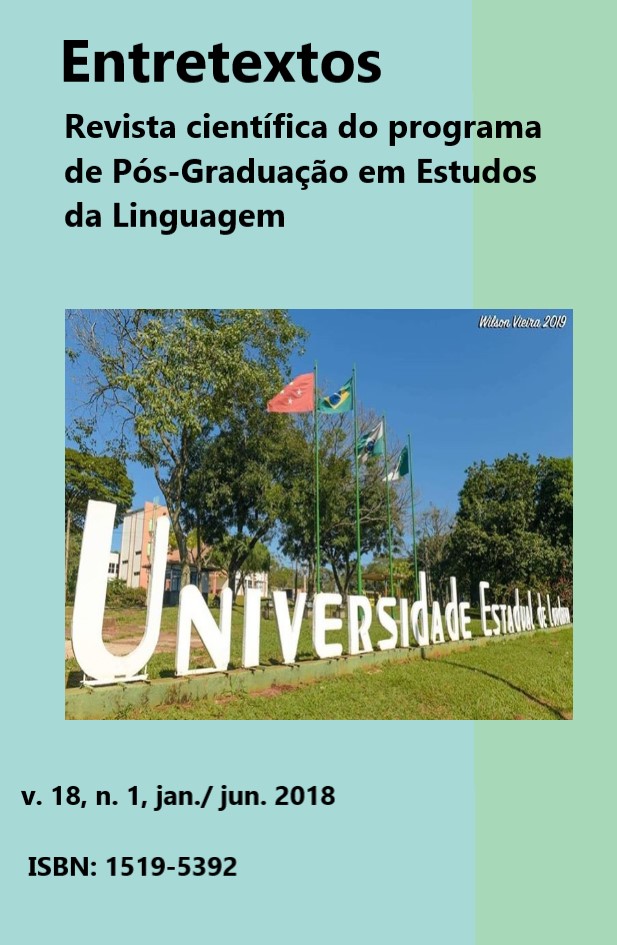The practice of orality in the classroom: the perspective of Portuguese-speaking teachers in the basic public education system
DOI:
https://doi.org/10.5433/1519-5392.2018v18n1p285Keywords:
Orality, Discursive Practice, TeachingAbstract
The present work has as its theme the discursive domain of orality practice. Among the practices foreseen for Portuguese language teaching in Curricular Guidelines of the State of Paraná (2008), it is common for Portuguese-speaking teachers to consider orality as more informal and more error-prone than writing practice. In this work, based on Dolz and Schneuwly (2011) and Marcuschi (1997; 2010), the proposal is to reflect on the importance of orality as a discursive practice, and, above all, on its teaching in Portuguese language classes. The conception and the way the orality practice is considered in the classroom were analyzed through questionnaires applied to Portuguese language teachers in the basic teaching network. This corpus of analysis showed that the teaching-learning of orality as a discursive practice is late and little accomplished. The teachers demonstrated a superficial conception of orality and a work perspective that does not privilege the practice of oral production, since the written genres are indicated as the most worked in the classroom.Downloads
References
BRASIL. Parâmetros Curriculares Nacionais: 3º e 4º ciclos do Ensino Fundamental: língua portuguesa. Brasília: Ministério da Educação e do Desporto, Secretaria da Educação Fundamental, 1998.
DOLZ, Joaquim; SCNEUWLY, Bernard. O oral como texto: como construir um objeto de ensino. In: DOLZ, Joaquim; SCNEUWLY, Bernard. Gêneros orais e escritos na escola. São Paulo: Cortez, p. 125-155, 2011.
FÁVERO, Leonor Lopes; ANDRADE, Maria Lúcia C.V.O; AQUINO, Zilda G.O. Oralidade e escrita: perspectivas para o ensino de língua materna. 8. ed. São Paulo: Cortez, 2012.
MARCUSCHI, Luiz Antônio. Oralidade e escrita. Signótica, Goiás, v.9, n.1, p. 119- 145, jan/dez, 1997. MARCUSCHI, Luiz Antônio. Da fala para a escrita: atividades de retextualização. 10.ed. São Paulo: Cortez, 2010.
PARANÁ. Secretaria de Estado da Educação do Paraná. Departamento de Educação Básica. Diretrizes Curriculares da Educação Básica - Língua Portuguesa. Paraná, 2008.
TRAVAGLIA. Luiz, Carlos. Gêneros orais - Conceituação e caracterização. In SIMPÓSIO NACIONAL DE LETRAS E LINGUÍSTICA, 14., SIMPÓSIO INTERNACIONAL DE LETRAS E LINGUÍSTICA, 4., 2013, Uberlândia. Anais ... Uberlândia: EDUFU, 2013. p. 1-8. Disponível em: http://www.ileel.ufu.br/anaisdosilel/wpcontent/uploads/2014/04/silel2013_15
VASCONCELOS, Maria Lucia. CASAGRANDE, Nancy. Oralidade e ensino: o difícil caminho da teoria à prática. Todas as letras. São Paulo, v. 17, n.1, p. 91-102, jan/abr. 2015.
Published
How to Cite
Issue
Section
License
Copyright (c) 2018 Entretextos

This work is licensed under a Creative Commons Attribution 4.0 International License.
Entretextos adota a Licença Creative Commons Attribution 4.0 International, portanto, os direitos autorais relativos aos artigos publicados são do/s autor/es.
Sob essa licença é possível: Compartilhar - copiar e redistribuir o material em qualquer suporte ou formato. Adaptar - remixar, transformar, e criar a partir do material, atribuindo o devido crédito e prover um link para a licença e indicar se mudanças foram feitas.























